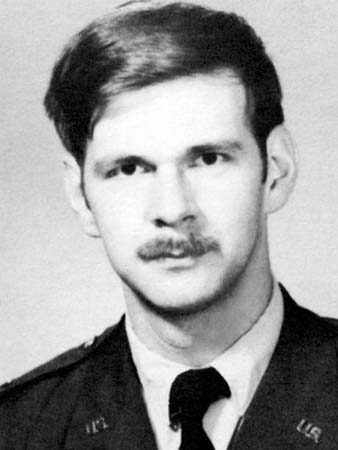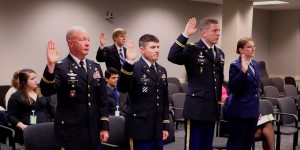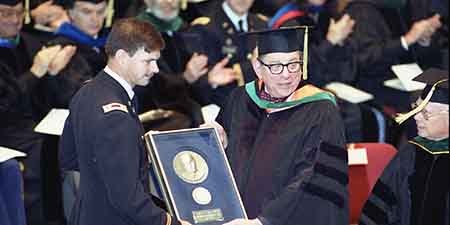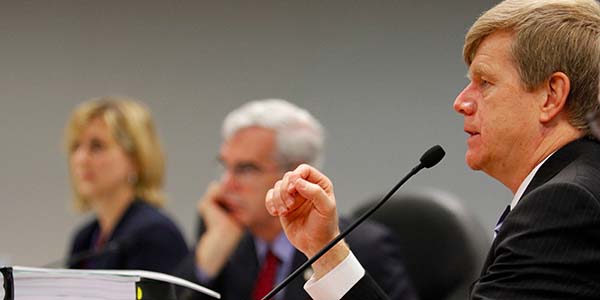
This Doctor was doing Per rectal examination of his students in the class for years! US Military Medical School teacher with weird teaching methods sacked!
U.S Military Doctor using ‘bizarre’ teaching methods found guilty
Dr. John Henry Hagmann, a former Army doctor teaching at Uniformed Services University campus in Maryland is being prosecuted after investigation revealed that he was- was injecting students with hypnotic drugs, inducing shock by withdrawing their blood, and performing rectal exams in class. Hagmann was escorted off the campus even as the college quickly offered students blood tests to determine if they had been exposed to any diseases, school President Charles Rice said.
The college also launched an internal investigation into Hagmann’s conduct, and it forwarded information to law enforcement authorities and the Virginia Board of Medicine, which revoked Hagmann’s license last month.
But records reviewed by Reuters, including the university’s own investigation, show that school officials had known of Hagmann’s teaching methods for more than 20 years. The records also show that three faculty members sat in on Hagmann’s course in 2012 but did not alert their superiors, despite witnessing practices that the school has since banned. One former dean even pushed to have Hagmann court-martialed in 1993 over similar allegations.
The Virginia medical board concluded in June that Hagmann (59), exploited students he trained in 2012 and 2013 at sessions in Virginia, North Carolina, Colorado and Great Britain. Some of those students testified that Hagmann performed penile nerve blocks and instructed them to insert catheters into one another’s genitals.

Army Col. Neil Page (L) and medical students who were identified as patient C, patient A and individual 2 (L to R) prepare to testify before the Virginia Board of Medicine regarding the medical practices of Dr John Henry Hagmann, in Richmond, Virginia June 19, 2015.
Hagmann’s courses in treating battlefield wounds were popular with the U.S. government, however. Since 2007, his company, Deployment Medicine International, has received at least $10.5 million in federal contracts from government agencies, including the FBI and U.S. Special Forces.

U.S. Army Medical Corps retired Lt. Colonel John Hagmann (L) is seen being presented the William P. Clements, Jr. Outstanding Uniformed Educator Award by Dr. Sam Nixon (R) during the U.S. Military’s Uniformed Services University of the Health Sciences 1989 Commencement Exercises in this USUHS handout file photo taken in Washington May 20, 1989.
Dr. Hagmann’s Defence
Hagmann has denied any wrongdoing and vowed to appeal the revocation of his license. In an email to Reuters this week, he wrote that, “The views of the civilian Board of Medicine and the academic institutions do not match the reality of law enforcement, other military, and special operations medical support training – or real missions.” None of the “over 1,000 physicians” who he says have taken his courses “felt the training was dangerous or inappropriate – only one medical student who recruited other students to complain.”
In June, Hagmann told Reuters that university officials long condoned his teaching techniques, which he says saves lives on the battlefield. “The same institution that is now making a complaint originally supported and encouraged the programs,” Hagmann said then.
In some ways, the university’s internal review reflects Hagmann’s claim that the school tacitly supported his approach to teaching battlefield medicine. Rice, who became school president in 2006, acknowledged that “there were flaws and gaps” in the university’s oversight. In 1986, during his second year as a professor at the university, Hagmann created a course to give students field experience treating combat wounds, the report says.
By the early 1990s, documents show, his techniques were similar to those that cost him his license this year: Students in his class performed procedures on one another and were provided nitrous oxide (laughing gas), as well as a drug to treat insomnia and the antihistamine Benadryl.
In sworn statements that are part of the report, unidentified colleagues offered varied descriptions of Hagmann: “an iconoclast and a cowboy,” someone who had “an almost magical spell-like effect on people,” and an officer “on a righteous mission … impatient with government rules.”
“He has a pied piper mentality,” Rice said.

Dr. John Prescott with the Association of Medical Colleges testifies before the Virginia Board of Medicine regarding the medical practices of Dr. John Henry Hagmann in Richmond, Virginia June 19, 2015.
A Management Problem
Some at the school, including Hagmann’s direct supervisor while he was on staff there, found him difficult. “I had to ride herd over him,” Colonel Craig Llewellyn told the school’s investigator. “He kept toying with things, playing fast and loose…” In a brief interview, Llewellyn said Hagmann repeatedly violated administrative rules.
In 1993, the report says, a dean at the school became so alarmed by Hagmann’s methods that she told a commandant that Hagmann should be court-martialed. It does not name the dean, who has since died, but the report says an unidentified official at the school determined that Hagmann’s conduct was not a military matter but an academic one.
The specific steps the university took in 1993 in response to the dean’s complaints remain unclear. The school did investigate the concerns and interviewed Hagmann and his supervisors. But the 2013 report takes officials to task for failing to stop Hagmann then. “Despite the dean’s grave concerns, the course continued…” the report says. “In any other unit, a troubled course … would have been discontinued immediately.”
Seven years later, in 2000, Hagmann retired from the university after he received a “less than favourable” performance review, according to the report. Shortly thereafter, Hagmann started his private training company, and the business of training troops to treat battlefield trauma boomed as wars raged in Iraq and Afghanistan.
Then, around 2007, Hagmann returned to the school “unofficially,” the report says. He began co-teaching a course, and by 2012, he was teaching a summer class on his own.
The report contends that Hagmann used the university “to subsidize his business.” Students provided free labour to help support his consulting company. And because he waived course tuition – about $2,000 per student – the school allowed him to use its classrooms for his private clients, the report says. Hagmann, in an email to Reuters, disputed the characterization.
Whatever the case, his teaching methods remained controversial. In addition to inducing shock by withdrawing blood from students, Hagmann plied class members with alcohol and had students perform penile nerve blocks on one another and on him, the report says. Two students told the Virginia medical board they have scars on their chests from class demonstrations.
‘Too far out’
One university professor, Patricia Deuster, was “shocked and dumbfounded” to learn Hagmann and his class had returned in 2012, the report says. Deuster, who declined to comment to Reuters, has taught at the school since 1984 and edited The Navy SEAL Physical Fitness Guide. “He was too far out on the edge,” Deuster told the school’s investigator.
The three doctors who allegedly witnessed Hagmann’s teaching but did not report the drug and shock demonstrations in 2012 no longer teach at the university, Rice said. He declined to identify them, and their names are redacted from the records.
The official who handled the school’s investigation, Colonel Neil Page, declined to comment. In his report, Page sharply criticizes the three former instructors, “Medical doctors and educators should have prevented this kind of demonstration, or should have asked serious questions over the purpose and safety,” he wrote.
At the time, the medical school did not have a policy against instructors using students as test subjects. Rice said the school has since created one.
Thus, among Hagmann’s legacies, is an asterisk in the student handbook with this reminder: “School of Medicine policy prohibits instructors or medical students from requesting medical students from serving as ‘patients’ for intrusive examinations or procedures, such as a rectal or genitourinary exam.”
Rice, who served as trauma surgeon to President George H.W. Bush, said the Hagmann matter is the most bizarre situation he has known in 40 years of government service.
“He shouldn’t be a physician,” Rice said. “He lost his compass somewhere.”
In light of the above article, it suffices to say that teaching via memorable and as realistic as possible methods is good. A line has clearly been crossed in this regard by Hagmann and the fact that he hasn’t been brought to task for over a decade is astounding and repulsive.
One hopes that, a strong law comes in to place that branch across all educational institutions (regardless of subjects taught) that protects students from such heinous acts. Student reviews and opinions are not mere performance appraisal metrics but a serious way to measure if a faculty is sticking to the boundaries of using legal and ethical teaching tools or mechanisms.
Content Courtesy:
Business Insider – 23.7.15
Reuters– 23.7.15
Image(s) Courtesy: Reuters & Washington Post – 23.7.15

